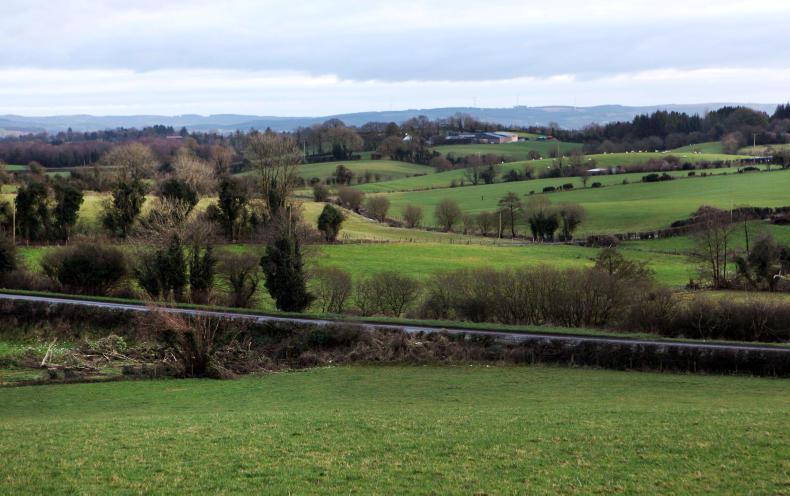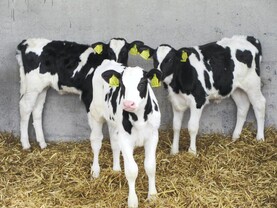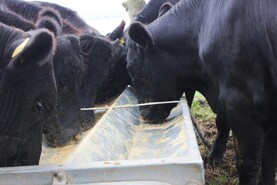The ministers responsible for agriculture in NI, Scotland and Wales are pushing for farm support payments to continue in the long term.
Speaking at the Oxford Farming Conference, NI Agriculture Minister Edwin Poots said that “expectations on farmers are increasing” and new schemes must be “adequately financed”.
“CAP payments have been of major importance in sustaining the industry in NI and underpinning its competitive trading position. This support must continue,” he said.
Similar points were made by farm ministers from Scotland and Wales, but while it is up to devolved ministers to design new schemes, the overall budget ultimately comes from the Treasury in London.
Fergus Ewing from the Scottish government argued that the UK Treasury “is intent on removing payments for farmers under the guise of having environmental payments”.
Let’s not cling to the bureaucratic system that we inherited from the EU
In his address at the conference, senior UK government minister George Eustice avoided the topic of long-term funding for farmers but indicated that a new approach to schemes is needed.
“We have got the opportunity to change things. Let’s not cling to the bureaucratic system that we inherited from the EU. Let’s think what a coherent policy looks like and go for it,” he said.
Change
The most radical change to farm policy is set to be in England, where payments will be mainly for environmental measures. The policy is based on “public money for public goods” where food production is not subsidised by taxpayers.
However, devolved ministers do not intend following England down that exact same path.
Fergus Ewing from the Scottish government said farmers will be paid for their role in producing food, protecting the environment, and sustaining rural communities.
“We do not believe that food production can be simply left to the market,” he said.
Farm schemes in Wales will have a strong focus on the environment, but Welsh Minister for Environment Lesley Griffiths stated that she also wanted to help farmers “produce sustainable food”.
I want to design support schemes that provide opportunities for all NI farmers
The clearest overview of how future schemes will work arguably came from NI Agriculture Minister Edwin Poots. He said that an area-based scheme will be used as a resilience payment for NI farmers, but at lower levels than the current Basic Payment Scheme.
A proportion of the NI budget will be allocated to coupled payments for the likes of suckler cows and breeding ewes, and other payments will be available for additional environmental measures.
“I want to design support schemes that provide opportunities for all NI farmers. Schemes and support are needed to help farmers develop their business, no matter where they farm,” he said.
Rewilding
The differences in opinion between UK farming ministers was also evident when a question was raised about so-called rewilding, where farmland is abandoned for natural restoration.
“Rewilding has thus far demonstrated to be a complete and total failure,” Edwin Poots responded.
“We saw that when crofters moved off the hills in Scotland and it reverted back to species which didn’t benefit biodiversity,” he argued.
However, George Eustice, who is responsible for agricultural policy in England, appeared less dismissive.
“We are not going to prescribe that this is something people should do, but for those that do want to do it, it is a choice that we want to help support,” he said.
Gene editing change proposed for England
Proposals have been put forward which would permit the use of gene editing within agriculture in England.
Speaking at the Oxford Farming Conference, environment secretary George Eustice said that gene editing differed from genetic modification as the DNA from one species is not mixed with another.
“What we are now able to do, through techniques such as gene editing, is more accurately move traits within the same species in a way that could happen naturally and therefore respects the rules of nature,” he said.
The Conservative MP said that the technology would accelerate genetic progress and he gave the example of breeding disease-resistant crops that require fewer inputs.
The proposals to change English law can be brought forward because of Brexit. In the EU, a legal ruling by the European Court of Justice in 2018 means that gene editing is regulated in the same way as genetic modification.
However, the European Commission is currently reviewing genetic technologies in the wake of the 2018 ruling and its findings are due to be published by April 2021.
No backsliding on UK
standards – trade chair
The group that was set up to advise the UK government on post Brexit trade policy will recommend that food import standards are not lowered as part of new trade deals.
“We will set our principles and strategies for a clear and ambitious international trade policy which will concentrate on maintaining our UK standards and values, on import and export policy,” said Tim Smith, the group’s chair.
Our starting point was simple – a UK trade policy which creates a fair and safe food and farming system for all, no race to the bottom, no backsliding on standards
In his address at the Oxford Farming Conference, the former Tesco director said the UK should promote high standards in environmental protection and animal welfare across the world.
The Trade and Agriculture Commission, of which UFU president Victor Chesnutt is a member, was originally established last July to produce a one-off report on post-Brexit trade policy.
“Our starting point was simple – a UK trade policy which creates a fair and safe food and farming system for all, no race to the bottom, no backsliding on standards,” said Smith.
The commission has since been made permanent and it will have a statutory role in producing reports on the impact that each new trade deal has on UK farmers.
“We have spent decades developing and homing our world-leading standards and there will be no turning back that clock,” Smith maintained.
The ministers responsible for agriculture in NI, Scotland and Wales are pushing for farm support payments to continue in the long term.
Speaking at the Oxford Farming Conference, NI Agriculture Minister Edwin Poots said that “expectations on farmers are increasing” and new schemes must be “adequately financed”.
“CAP payments have been of major importance in sustaining the industry in NI and underpinning its competitive trading position. This support must continue,” he said.
Similar points were made by farm ministers from Scotland and Wales, but while it is up to devolved ministers to design new schemes, the overall budget ultimately comes from the Treasury in London.
Fergus Ewing from the Scottish government argued that the UK Treasury “is intent on removing payments for farmers under the guise of having environmental payments”.
Let’s not cling to the bureaucratic system that we inherited from the EU
In his address at the conference, senior UK government minister George Eustice avoided the topic of long-term funding for farmers but indicated that a new approach to schemes is needed.
“We have got the opportunity to change things. Let’s not cling to the bureaucratic system that we inherited from the EU. Let’s think what a coherent policy looks like and go for it,” he said.
Change
The most radical change to farm policy is set to be in England, where payments will be mainly for environmental measures. The policy is based on “public money for public goods” where food production is not subsidised by taxpayers.
However, devolved ministers do not intend following England down that exact same path.
Fergus Ewing from the Scottish government said farmers will be paid for their role in producing food, protecting the environment, and sustaining rural communities.
“We do not believe that food production can be simply left to the market,” he said.
Farm schemes in Wales will have a strong focus on the environment, but Welsh Minister for Environment Lesley Griffiths stated that she also wanted to help farmers “produce sustainable food”.
I want to design support schemes that provide opportunities for all NI farmers
The clearest overview of how future schemes will work arguably came from NI Agriculture Minister Edwin Poots. He said that an area-based scheme will be used as a resilience payment for NI farmers, but at lower levels than the current Basic Payment Scheme.
A proportion of the NI budget will be allocated to coupled payments for the likes of suckler cows and breeding ewes, and other payments will be available for additional environmental measures.
“I want to design support schemes that provide opportunities for all NI farmers. Schemes and support are needed to help farmers develop their business, no matter where they farm,” he said.
Rewilding
The differences in opinion between UK farming ministers was also evident when a question was raised about so-called rewilding, where farmland is abandoned for natural restoration.
“Rewilding has thus far demonstrated to be a complete and total failure,” Edwin Poots responded.
“We saw that when crofters moved off the hills in Scotland and it reverted back to species which didn’t benefit biodiversity,” he argued.
However, George Eustice, who is responsible for agricultural policy in England, appeared less dismissive.
“We are not going to prescribe that this is something people should do, but for those that do want to do it, it is a choice that we want to help support,” he said.
Gene editing change proposed for England
Proposals have been put forward which would permit the use of gene editing within agriculture in England.
Speaking at the Oxford Farming Conference, environment secretary George Eustice said that gene editing differed from genetic modification as the DNA from one species is not mixed with another.
“What we are now able to do, through techniques such as gene editing, is more accurately move traits within the same species in a way that could happen naturally and therefore respects the rules of nature,” he said.
The Conservative MP said that the technology would accelerate genetic progress and he gave the example of breeding disease-resistant crops that require fewer inputs.
The proposals to change English law can be brought forward because of Brexit. In the EU, a legal ruling by the European Court of Justice in 2018 means that gene editing is regulated in the same way as genetic modification.
However, the European Commission is currently reviewing genetic technologies in the wake of the 2018 ruling and its findings are due to be published by April 2021.
No backsliding on UK
standards – trade chair
The group that was set up to advise the UK government on post Brexit trade policy will recommend that food import standards are not lowered as part of new trade deals.
“We will set our principles and strategies for a clear and ambitious international trade policy which will concentrate on maintaining our UK standards and values, on import and export policy,” said Tim Smith, the group’s chair.
Our starting point was simple – a UK trade policy which creates a fair and safe food and farming system for all, no race to the bottom, no backsliding on standards
In his address at the Oxford Farming Conference, the former Tesco director said the UK should promote high standards in environmental protection and animal welfare across the world.
The Trade and Agriculture Commission, of which UFU president Victor Chesnutt is a member, was originally established last July to produce a one-off report on post-Brexit trade policy.
“Our starting point was simple – a UK trade policy which creates a fair and safe food and farming system for all, no race to the bottom, no backsliding on standards,” said Smith.
The commission has since been made permanent and it will have a statutory role in producing reports on the impact that each new trade deal has on UK farmers.
“We have spent decades developing and homing our world-leading standards and there will be no turning back that clock,” Smith maintained.






 This is a subscriber-only article
This is a subscriber-only article










SHARING OPTIONS: